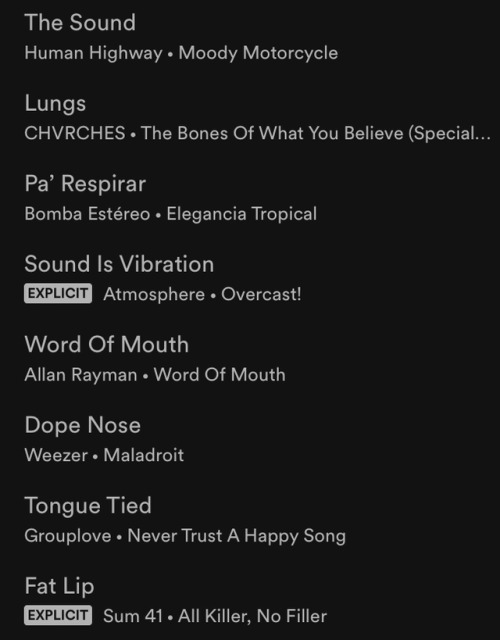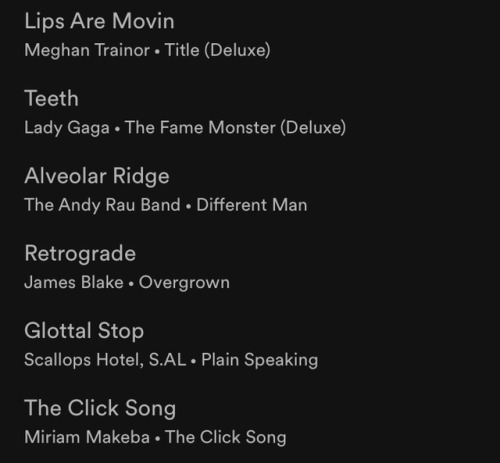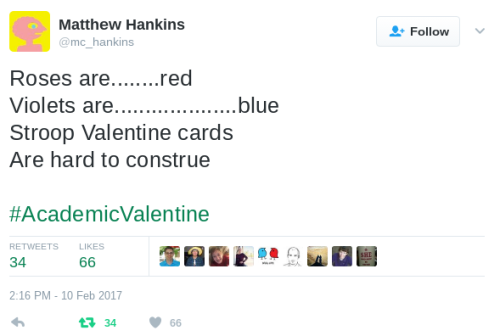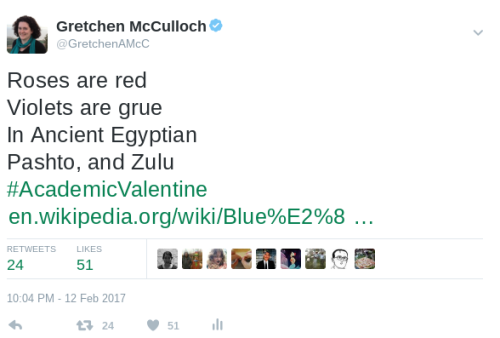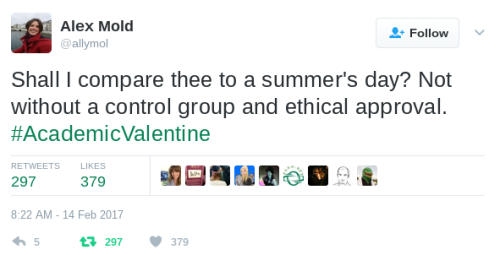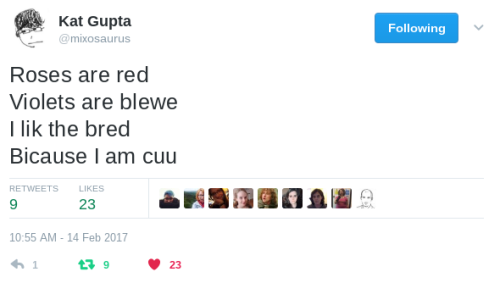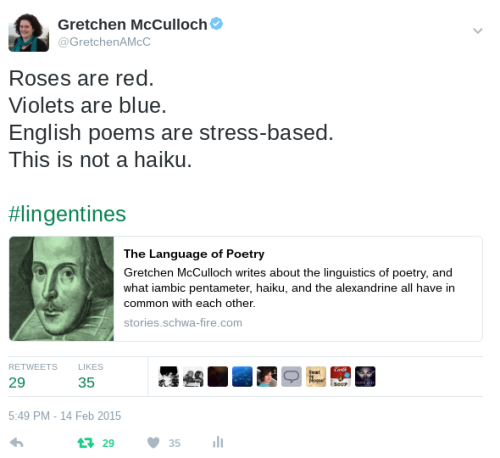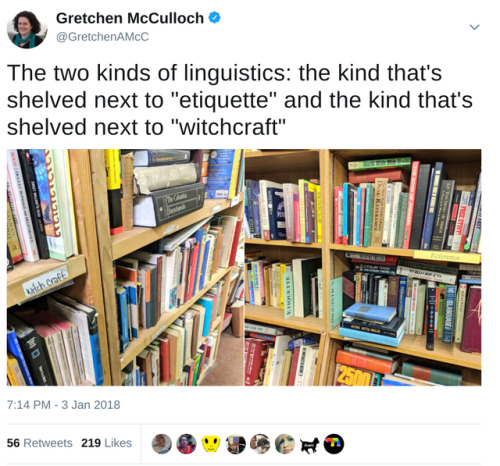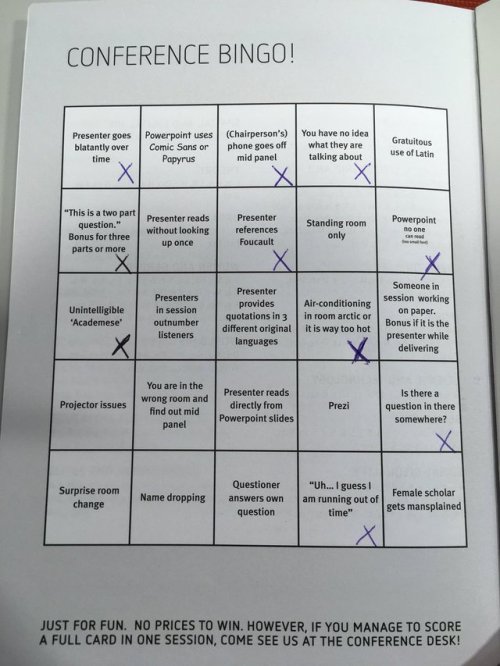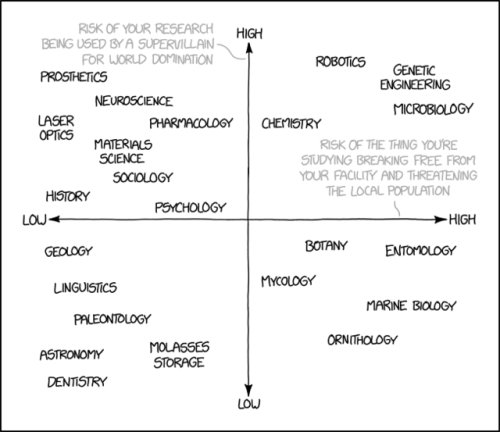#linguistics itself
This is an extensive Spotify playlist by Ty Slobe containing 69 songs about phonetics, and it is my new favourite thing. The post explaining all the songs is also amazing. I really hope this is the beginning of a “subfields of linguistics” playlist trend.
Post link
Linguisticandacademicvalentines,viatwitter.
(More context on Stroop tests,grue, “i lik the bred”, and the stress system of English poetry.)
Post link
Me: i’m taking an online linguistics course this semester.
My dad: isn’t that a type of pasta?
I’m so excited to share this paper on data citation in linguistics, published in Linguistics. Not just because it was co-authored with 13 other linguists, including some of my linguistics heroes, but because it articulates so much of what we need to do to improve the way linguists think about data. (it’s Open Access, so you can read/download and share as you wish!)
I’m often reminded of something Nicholas Evans likes to say:
“Linguistics has a unique but unfulfilled destiny, as the most scientific of the humanities and the most humanistic of the sciences.”
It captures what I love about linguistics, but I think it also explains why we have a complicated relationship with the idea of data, and its management. This position paper outlines why it is important that linguists think about the data on which linguistic claims are made.
My Favourite line
Linguistic data are the very building blocks of our field. Given that linguistic theories need to be borne out through data, we believe that linguistic data are important resources in their own right and represent valuable assets for the field. Therefore, our field needs to accept responsibility for the proper documentation, preservation, attribution, and citation of these assets. The responsibility to do so is an integral part of linguistic research, and it should be collectively shared by individual scientists and researchers, data stewards, research institutions, and funding organizations.
Article writing Trivia
- I’ve been working on some parts of this paper with Andrea Berez-Kroeker since 2013. Andrea has been working on some of the central ideas in this paper for even longer. Academia is a slow game sometimes, but this paper says a lot of things that a lot of the authors have been thinking about for a long time.
- A lot of ideas in this paper formed the initial motivation for the Austin Principles of Data Citation in Linguistics
- There is a reference to work on bacteria in human navels as an example of replicable research because I had read about Carl Zimmer’s participation in this research on his blog a couple of years early and it amused me greatly.
Abstract
This paper is a position statement on reproducible research in linguistics, including data citation and attribution, that represents the collective views of some 41 colleagues. Reproducibility can play a key role in increasing verification and accountability in linguistic research, and is a hallmark of social science research that is currently under-represented in our field. We believe that we need to take time as a discipline to clearly articulate our expectations for how linguistic data are managed, cited, and maintained for long-term access.
See also
- Putting practice into words: New paper out about methods and data in descriptive grammar writing
- Linguistics Data Interest Group - New RDA group to improve data citation and transparency
- The Austin Principles of Data Citation in Linguistics
Reference
Berez-Kroeker, A.L., L. Gawne, S. Kung, B.F. Kelly, T. Heston, G. Holton, P. Pulsifer, D. Beaver, S. Chelliah, S. Dubinsky, R. Meier, N. Thieberger, K. Rice & A. Woodbury. 2018. Reproducible Research in linguistics: A position statement on data citation and attribution in our field. Linguistics. 56(1): 1-17.
10.1515/ling-2017-0032
“what is a linguist?”
linguists: a person who studies language at a meta level; a language scientist
average non-linguist: a walking dictionary, encyclopedia, spelling/grammar-checker, & translator
amazon, google, microsoft: a data scientist specializing in ontology
What does it really mean to be “linguist”? Or maybe I should phrase it another way. What do you need before you can call yourself one?
Is a Linguist someone who got a PhD in a linguistics-related degree? Someone who works with linguistics in academia? Or what?
It is a state of mind. If you think of yourself as a linguist, you are one.
I know a handful of excellent linguists who never or not yet obtained a degree in linguistics or a related field. And I also know of a few professors of linguistics who I’d never consider to be real linguists.
Thanks for your reply.
I was thinking about this cause when we were doing our undergraduate linguistics course one of our teachers called us linguists already but when I called myself one to a friend they said “You aren’t a linguist. You’re just studying.”
I’m doing my Master’s currently and there are some claims that I personally challenge but I don’t feel confident in writing because I’m afraid my teachers may dismiss my [unpopular] opinions as simply “ha you disagree probably because you haven’t read enough literature”.
I’m aware that’s no way for progress but it’s something I worry about nonetheless.
ForGlottopedia, Martin Haspelmath and I had to come up with some kind of definition of “linguist” in order to determine who would be allowed to register an account and edit stuff. We settled on a definition that can be reduced to ‘person who does linguistics’.
We elaborated on it in the FAQ:
- Glottopedia is being created by academic linguists, i.e. linguists with a current or previous affiliation with a university or other academic institution (including advanced students of linguistics and independent scholars with an academic background).
- There can be biographical articles on anyone who made a contribution to the academic field of linguistics. This is in contrast to Wikipedia, which allows articles only on “prominent” persons. (However, to avoid the issue of personality rights, Glottopedia allows full biographical articles only for dead linguists. For living linguists, the biographical articles must be restricted to links.)
Two scientists walk into a bar:
“I’ll have an H2O.”
“I’ll have an H2O, too.”
The bartender gives them both water because he is able to distinguish the boundary tones that dictate the grammatical function of homonyms in coda position as well as pragmatic context.
Q. Two linguists walk into a bar. Which was the specialist in contextually-indicated deixis and anaphoric reference resolution strategies?
A. The other one.
Two syntacticians walk into a’
Do y’all consider linguistics STEM? Because according to the US National Science Foundation it is.
I think the problem with any sort of classification like this is that linguistics is an umbrella term for such a vast range of sub-fields: sociolinguistics, computational linguistics, phonetics, phonology, morphology, syntax, semantics, pragmatics, forensic linguistics, neurolinguistics etc. (and everything that falls within those because some of those sub-fields aren’t particularly small or uniform either)… there’s no straightforward answer for what “linguistics” is/ whether it should be under science or under arts (which in itself is not a very useful dichotomy)/ whether it’s STEM or not
I’ve seen this post circling multiple times with very different opinions attached to it but I’d say I agree with this one the most.
- “How many languages do you speak?” The words ring in your ears. They haunt you in the night. You used to speak one, maybe more. But now, you speak none. You have explained this too many times and your voice has faded with every syllable in every repetition of the answer.
- When you dream, you dream in IPA. When your professors speak, you do not hear content. You hear words. You hear velar stops, palatal glides, interdental fricatives. You hear accent and cadence and idiosyncratic expressions that do not match the hometown the voice is from. These are the things that have taken your mind away - there is no content now, only its delivery.
- Noam Chomsky’s presence looms like a titan God over your classrooms, over your textbooks, your research. There was nothing before him. There is nothing after him. There is nothing now but generative grammar and the language organ. Grammar has always been universal, yet our individual forms of conversation fall short still across linguistic boundaries.
- “This is a wug,” you repeat to yourself in your darkest moments, locked up in the library past its closing hours analyzing Mongolian vowel harmony until your brain is breaking. Your lifeblood is caffeine, your soul is made of phonological rules and constraints. “This is a wug,” you say again, more softly this time. “Now there are two. There are two…” The words have nothing to do with the assignment, but they have always brought you comfort somehow.
We will not tolerate prescriptivism in this Linguistic house
One of my friends keeps telling me that a linguistics degree is useless and I want to prove him wrong. Someone should reply with what they do with their linguistics degree.
for what it’s worth, i currently tutor in different languages, but i’m also able to teach english abroad, i’ll be teaching spanish back at home while i get [another degree in linguistics].
but overall, linguistics isn’t useless ! i had the same things told to me when I first announced I was switching majors.
even staying at a bachelor’s level in linguistics gives you a lot of great soft skills that are transferable to the workplace. a degree will never be the ONLY key to achieving your goals. as long as you know how a linguistics degree will apply for your future, you’re golden!
Looking for pop linguistics books or linguistics-related fiction to read, find in a library, ask for as a gift, or give to a language nerd in your life? Here’s an extensive list of books you might be interested in.
New nonfiction books!
- Because Internet by Gretchen McCulloch (my book about internet language, 2019)
- Language Unlimited by David Adger, 2019
- Don’t Believe A Word by David Shariatmadari, 2019
- Babel: Around the World in 20 Languages by Gaston Dorren, 2018
- The Prodigal Tongue by Lynne Murphy (my livetweet), 2018
Recent general books
- John McWhorter has many pop linguistics books, including notably: The Language Hoax, The Power of Babel,Our Magnificent Bastard Tongue,What Language Is,Word on the Street
- David Crystal also has many pop linguistics books, including more recently: the history of English spelling,A Little Book of Language (note that Crystal also writes “interesting facts about words” books, so check the description if this is a relevant factor for you)
- The Sense of Style by Steven Pinker (the one style book on this entire list, because he approaches it from a genuinely linguistic perspective: see my review here).
- The Riddle of the Labyrinth by Margalit Fox (about cracking Linear B)
- You Are What You Speak by RL Greene
- The Unfolding of Language by Guy Deutscher (about the history of language)
- How Babies Talk by Roberta Michnick Golinkoff and Kathy Hirsh-Pasek
- In The Land of Invented Languages by Arika Okrent (my review)
- The Art of Language Invention by David J. Peterson (my livetweet)
- Word by Word by Kory Stamper, who also has a second book coming out! (my livetweet)
- You’re The Only One I Can Tell by Deborah Tannen
Older general books
(Most of these I read when I was getting into linguistics so I can vouch for them being interesting enough when I read them such that they’ve stuck in my mind many years later, but I’m not sure how they’d stack up on re-reading. Just so you know.)
- Steven Pinker’s pop linguistics books have gotten older but are still classics: The Language Instinct,Words and Rules,The Stuff of Thought
- Older David Crystal books: How Language Works,The Stories of English
- Verbatim (a collection of essays on pop linguistics, edited by Erin McKean - my comments)
- Talk, Talk, Talk by Jay Ingram
- A Mouthful of Air by Anthony Burgess
- Alpha Beta by John Man (about the history of the alphabet)
- The Articulate Mammal by Jean Aitchison
- Deborah Tannen has several older highly readable books on conversation, including You Just Don’t Understand,That’s Not What I Meant!,You’re Wearing That?
Specific Topics
- Hearing Gesture by Susan Goldin-Meadow
- Talking Hands by Margalit Fox (my comments)
- The Language of Food by Dan Jurafsky
- Babel No More by Michael Erard
- Latin Alive: The Survival of Latin in English and the Romance Languages by Joseph Solodow (my review)
- Predicting New Words by Allan Metcalf
- Shady Characters by Keith Houston (about punctuation marks - my comments)
- Speculative Grammarian’s satirical linguistics book(my review - you should probably already know some linguistics before reading it though)
- How We Talk by Nick Enfield (review on Superlinguo)
- An ABC for Baby Linguists (great for linguist parents!)
- The Language Construction Kit by Mark Rosenfelder (conlangs, older)
- How to Keep Your Language Alive andLanguage Revitalization for Families, both by Leanne Hinton (see also Ola!, and my thoughts on it)
- The Signs of Language by Bellugi/Klima (a sign language classic, but readable)
Beginner-friendly textbooks
Comprehensive but more friendly than actual textbooks:
Actual textbooks, still at an introductory level:
- Language Files
- Contemporary Linguistics (thefifth edition is also fine, and cheaper)
- iLanguage (previous edition is cheaper)
- Describing Morphosyntax is popular among budding conlangers
LingFic
Fiction that contains a significant linguistic element, enjoyable for both practising linguists and language enthusiasts:
- Ella Minnow Pea by Mark Dunn (my comments)
- The Last Samurai by Helen DeWitt (my livetweet)
- Ancillary Justice by Ann Leckie (my comments) and Left Hand of Darkness by Ursula K. LeGuin, both of which do interesting things with language & gender
- Carry On by Rainbow Rowell (my livetweet)
- Eunoia by Christian Bök (my comments). It’s entirely online here.
- Bel Canto by Ann Patchett
- New Finnish Grammar by Diego Marani (reviewfrom@superlinguo)
- Native Tongue trilogy by Suzette Haden Elgin
- “The Story of Your Life” (short story) by Ted Chiang (the movie based on it is called Arrival and stars a linguist)
- A Clockwork Orange by Anthony Burgess
- Embassytown by China Miéville
- TheLord of the Rings books
- See also more recommendations on the #lingfic hashtag andthis list at conlang.org
Anyone else have pop linguistics books (or #lingfic) to recommend, or reviews to link to? I’ll try to keep this list updated as I hear of and review other books, old and new, so make sure to check out the source post andmy books tag if you’re viewing it as a reblog. There are some great additions in the extensive reblogs by Stan CareyandSuperlinguo.
Fiction Updates:
- Too Like The Lightning by Ada Palmer (my livetweet)
- The Fifth SeasonandThe Obelisk Gate by N.K. Jemisin (my twolivetweets)
- PygmalionandMy Fair Lady are classics, although real linguists aren’t nearly as keen on “proper” English as Henry Higgins
- The Space Trilogy by C.S. Lewis features a philologist
- The Raven Tower by Ann Leckie (my livetweet)
I also keep a list of linguistically interesting fiction (lingfic) on Goodreads.
Revised and updated for another year!

